Derek Thompson's Blog, page 17
June 15, 2014
Seven Useful Tools
 Sometimes it seems as though the writing life is just so damned complicated. You can't help wondering how the likes of Hemingway or Jack London managed with just a writing pad, a typewriter, and a bottle of liquor for company. But manage they did; they and countless others who did not have the blessings - and the tribulations - of technology to get them to The End.
Sometimes it seems as though the writing life is just so damned complicated. You can't help wondering how the likes of Hemingway or Jack London managed with just a writing pad, a typewriter, and a bottle of liquor for company. But manage they did; they and countless others who did not have the blessings - and the tribulations - of technology to get them to The End.Are you overwhelmed by choices and possibility?
Do you ever feel that sometimes this writer's life is missing something? I think I can help. I know just what's missing.
It's you.
Unless your writing has your undivided attention, mentally and emotionally, you're doing it - and your readers - a dis-service.
Fret ye not. Here are seven everyday tools to help you free up the writer within.
1. An Alarm clock. (What? You were expecting a high value development system?) This state-of-the-art time measuring tool will enable you to get up earlier, keep track of your time - in real time, and give you a reminder when your writing time starts and ends.
2. Spreadsheets. Yes, I know, it doesn't sound very creative but bear with me. Spreadsheets can help you track your submissions (so you're not waiting a year like I did...), keep running totals of chapter and story word counts, and - when the money starts rolling in - use formulae to work out profit, loss, tax and expenses. All you have to do is set the spreadsheet up properly (see Youtube!) and remember to input the data.
3. The trusty notepad and pen. Sure, it seems obvious. But how many times have you had a brilliant idea and by the time you commit it to paper your precious treasure has become a tarnished knick-knack? That notepad should go everywhere with you except in the shower. You can use a permanent marker for that and clean it off somehow later.
4. An answering machine. If you're writing, bar a genuine crisis (that's bigger than your protagonist's crisis), you are not available. You can leave a message to that effect if it makes you feel any better. Think of it as a time stealer training device. The more seriously you take your writing, the more seriously other people will too.
5. The remote control. I like Judge Judy as much as the next writer, and some fly-on-the-wall documentaries are truly compelling, but what about the dramas in your own head waiting for an audience? Turn off, or turn off and record, and prioritise your activities in line with your intentions.
6. A writing system that cannot go online. This could be an A4 writing pad; or an old laptop; or an old laptop, a router and some self control. You can make a note of anything you need to research and tackle it later to avoid interrupting the flow.
7. An open window. This will provide you with fresh air, cunning designed by Nature to help keep you awake. It will also provide background noise, and occasionally speech, to ground you in reality (now and again) and help to inspire you.
Just to show I take my own advice, I am switching off the TV for July. I will record anything I feel is worth waiting a month for, and any actual downtime can be used to watch the 30 hours of recorded material (mostly films) that I've never found time for in the last two years. I'll let you know how I get on!
Published on June 15, 2014 13:00
June 5, 2014
What Rejection Can Teach Us
 "I'm afraid it's going to have to be a 'no' from me."
"I'm afraid it's going to have to be a 'no' from me."David French and I once wrote that rejection was just life's way of telling you you're unworthy. Despite that note of hilarity, it may seem as though there's nothing to be gained from a rejection other than an increased desire for chocolate. However, some rejections can be very useful indeed, once you know how to interpret them.
By way of illustration, here are three recent nil pointsfrom my own table along with some thoughts.
1. Sample material from one of my novels to a literary agent.
"While we enjoyed reading your submission, which stood out from the many we receive, we couldn't find an agent here who felt strongly enough to take it further and therefore we are afraid we are not able to offer you representation for this project."
I'll start by saying that I always take rejections on trust. It saves time. I don't assume they're just being kind, or that they'd love to discuss it with me further at great length and preferably in person over coffee. It just is what it is - all they need me to know is in the words.
The highlights, as I see it- They enjoyed reading it.- It stood out from the many.- They couldn't find an agent who felt strongly enough about it.
For me, the key question then is why didn't an agent feel strongly enough about it?
The following thoughts arose- Did I target the right agent and / or the right agency?- Does my book have enough commercial potential?- What changes could I make - and would I be willing to make - before the next submission?
An afterthoughtThese days there is little value in writing back to agents. They're snowed under and, realistically, they'll probably refer you to The Writers' & Artists' Handbook, or The Writers' Handbook, or even one of their own courses.
Okay, next please.
2. This time it was a short story submission to a prestigious magazine.
:This piece was poetic and provocative, for some reason it reminded me of Keats with its longing. I really think it would work better as a poem than a story, because the event described is so isolated and framed in beauty. We’re taking a pass on this in its current fiction form, but please do feel free to rework it/resend it or dazzle us with your other stories when we re-open."
The highlights, as I see it- They clearly read it carefully and understood the effect I was going for.- I achieved that effect to some extent.- They're clear about what they'd like to see in order to consider it afresh.- I know that such poetry is not within my repertoire.
The following thought arose- Maybe a new piece in a different genre might interest them.
An afterthoughtI sent one in and I hope to hear back in a couple of months.
3. This final rejection is from the People Per Hour freelancing site.
"Offered to another bidder, price was not the factor. Thank you for your time."
The highlights, as I see it- My pricing for the job was appropriate.
The following thoughts arose- Was my pitch right for the client?- Was the client right for me?
In the end, the worst rejections - and indeed the only really useless ones - are those that tell us nothing new beyond 'no thanks'. In the end, it's a piece of information we can sometimes learn from and develop as a consequence.
Now, where's that chocolate?
Published on June 05, 2014 11:54
May 31, 2014
Underground Writer
 Maybe Snaresbrook?Of all of Rudyard Kipling's six serving men (you don't need a link - you can search for it on the web if you don't already know them), I think the most powerful is what - especially when it's followed by if. And yes, that is another Rudyard Kipling reference - well spotted.
Maybe Snaresbrook?Of all of Rudyard Kipling's six serving men (you don't need a link - you can search for it on the web if you don't already know them), I think the most powerful is what - especially when it's followed by if. And yes, that is another Rudyard Kipling reference - well spotted. What if enables us to bring together entirely unrelated ideas and subjects, just for the curiosity of seeing what would happen. It can helps us write fiction, or comedy, or fill a blog post when we hadn't had time to put one together and a self-imposed deadline is looming. But enough talk of me.
Two of my favourite things (yes, I can hear the tune too) are advertising and the London Underground. The first fascinates me because it uses concepts to sell products through a variety of techniques, among them: word play and association. The London Underground forever has a place in my heart because I grew up in London. Anne even bought me a book of disused tube stations for my birthday. Now that is commitment.
What the flip has any of this to do with a rushed blog post I hear you thinking. (I have exceptionally good hearing in that respect.) Well, what if tube stations were renamed to take advantage of brand sponsorship? Where would that leave us? Round about here...
Alpen-ton Angel Delight Argos Grove Marsenal Baker's Complete Street Barbican Lager Brent Cross Buns Burnt Oak Smoked Sausages Canada Dry Water Cockfosters Lager Crocs-ley Debdenhams East Action Man East Ham & Cheese Toast Toppers Elephant & Castile Soap Eustone's Ginger Wine Abercrombie & Fitchley Road Terry's All Goldhawk Road Green & Black's Park Hammerite-smith Old Holborn Hyde Park Muller Fruit Corner Kingsmill-bury Marylebone-io Millets Hill East Monumenthols North Airwick Park Costerley Cutters Pimms-lico Theydon Bois Own Paper Tottenham Pale Ale Tuf Shoes Park Victoria Sponge Wat-Ford Focus John West Ruislip Woodbines Lane
Published on May 31, 2014 12:14
May 25, 2014
Schtick
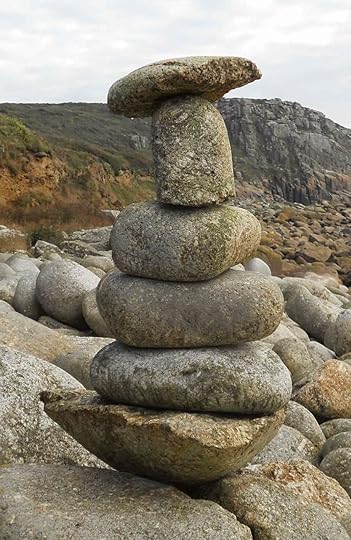 My As Above So Below magazine co-creator, and former sketch writing partner, David French, came up with the following gag: Two heads are better than one, but it's hard to find a hat that fits. He has a point.
My As Above So Below magazine co-creator, and former sketch writing partner, David French, came up with the following gag: Two heads are better than one, but it's hard to find a hat that fits. He has a point.Even as a writer of fiction (itself one of my writing heads), I jump from genre to genre as the mood or the muse takes me. Long fiction or short fiction, I can usually pick out the influences - and influencers - of a story. Sometimes it's the style of writing; sometimes it's the voice or setting. It can be direct inspiration, such as Raymond Carver's voice in my head when I wrote Saturday Night and other tales after reading Will You Please Be Quiet, Please? Harlan Coben's pacing, Raymond Chandler's dry humour and a dash of Mark Billingham's grittiness seeped into Standpoint and the other Bladen novels. Sci-fi story Rogue owes a debt to Asimov and Perfect Circle quietly nods to Huxley.
I used to worry that my own voice would sometimes be lost in the chorus, as if the process of trying on different hats might rob me of the opportunity to speak for myself. The truth is more complex, I think. I am all those voices and I quite like the multiplicity. I suspect that's why some of my favourite freelancing jobs have been those that required writing in character.
I used to call it cross-referencing when I was younger - the way that anything and everything led to something else. I think I'm wired that way, taking on personae or linking things together even if they appear disparate at face value. It might also explain why I enjoy the process of comedy writing so much - the collision of ideas and inversions.
Perhaps the two stories that are most demonstrably me are fantasy Covenant, my first novel (we don't count the teen novel that went into the flames), and Scars & Stripes, a semi-autobiographical comedy drama, even though the narrator - to my ears - sounds a little like Clive James at his most sanguine.
The moral of this ramble is that your duty as a writer is to find out who you are on the page and away from it. A good sign that you're getting somewhere, however many hats you end up wearing, is when people have a strong response to your words. When readers care enough about what you write to review your work - whatever they think - you know you're on to something.
I'm several voices, across several genres, across several types of writing. That's my schtick. What's yours?
Published on May 25, 2014 12:53
May 15, 2014
Change Please - Part 1
 Magnolia needn't be dull.No, not a promo for one of my excellent and delightfully affordable ebooks; instead, a pause for reflection. If writing teaches us anything, it's that change is inevitable. The blank page, if worked upon, becomes a tentative piece of writing and then develops into something. (Even disillusionment is something!)
Magnolia needn't be dull.No, not a promo for one of my excellent and delightfully affordable ebooks; instead, a pause for reflection. If writing teaches us anything, it's that change is inevitable. The blank page, if worked upon, becomes a tentative piece of writing and then develops into something. (Even disillusionment is something!)The same is true of writers themselves. When we stick with the practice of writing, we develop - on the page and off it. We learn as we go, playing to our strengths and, hopefully, working on our weaknesses.
Sometimes what becomes a strength isn't what we were naturally good at; we were simply motivated enough to become proficient. Proficiency in a subject or a skill can be absolutely fine and needn't take 10,000 hours to get there. Sometimes you reach a destination only to find, although you've enjoyed the journey, you never want to go there again.
As a freelancer I started off with a simple (one might say, naive) strategy, which was never to turn any work down. I'd left corporate-ville with a my skills and aspirations tied to a stick and I was keen to experience the wider world of writing and being a writer. Consequently, in many respects I've been something of a generalist.
In fact, by my estimation, I've written or edited across a range of subjects, including but not limited to:
Sushi, yoga, poo, voucher discounts, weddings, sex, matchmakers, VOIP, exhibitions, technology and software, PTSD, ageism at work, surveillance, new businesses, interior design, website design, social media, branding, life-long learning, online dating, a detective agency, education, interviews, coaching, freelance writing, safeguarding, staff motivation, parental engagement, exercise, cycling, art, health, green living, green tech, television and, of course, chickens.
It's a diverse track record and, as business branding experts will tell you, it's better to establish a specialism (preferably more than one) to enable the clients you want to find their way to you.
Let's call that the horizontal change, leading us naturally to consider a vertical change.
Like I said, back in paragraph four (You remember? We had tea and cakes at the time.), my approach to freelancing was pretty simple at the outset:
1. Find clients.
2. Provide writing services for them.
3. Get paid.
4. Return to item 1, lickety split.
Even in the short time I've been freelancing the landscape has changed (some might say evolved while others prefer degenerated). So-called content farms spring up like wildflowers or weeds, depending on your perspective. There are also numerous sites out there now, offering writing work for businesses or others that host small ads. Often, several sites host links to the same small ad - and we'll come to that in a moment.
Returning to my theme of change, before you have to catch your bus, no strategy lasts forever. As you progress, you re-evalusate what works (and how effectively) and what doesn't.
See, that didn't take long.
I can't recall how I first found Craigslist, but ole Craig has been good to me. I used to frequent Craigslist - frequently - when I had no other writing work on the go. By trial and error, I figured out which cities offered the best prospects (some of which were not what I expected), and which to avoid. Thanks to Paypal and the letter 'z', I ploughed a satisfying furrow across North America, notching up a variety of unconnected adventures such as: selling a Volkswagen Beetle (thanks, Kyle), notching up a brief stint as a Toronto magazine columnist, helping to brand a raccoon (it's a long story) and connecting with Thorn Sully and everyone at A Word with You Press in Moscow, Missouri (an even longer and funnier story).
Overall, Craig's List has made me several hundred pounds (more, actually, but no one likes a show-off). Also, it has to be said, I've been ripped off once or twice, which statistically is par for the course. (Yes, I know there's a Craigslist white paper in all of that somewhere - quote me a price...)
However, just as a novelist wouldn't expect their fiction to remain the same forever, so a freelancer needs to develop how they do business. More on that in Part 2, in due course.
In the meantime, Craig, we'll always be friends.
Published on May 15, 2014 01:38
May 5, 2014
Newsclash
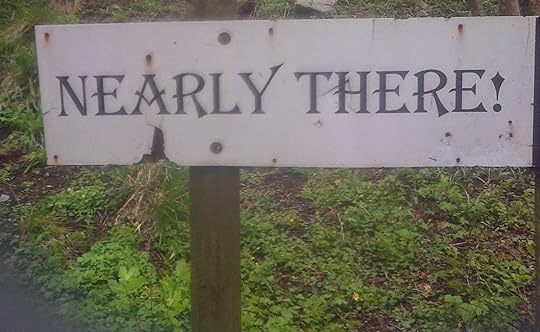 Often, in the frenetic pursuit of publication and plaudits, it's easy to forget why we became writers in the first place. Back in the day, when I picked up a pen and scribbled notes down in my teens, I wasn't thinking about seeing my name in lights. I was spending time alone, trying to make sense of the world and conjuring ideas for their own sake. (Dark ones, often, given that I wasn't a very jolly teen.)
Often, in the frenetic pursuit of publication and plaudits, it's easy to forget why we became writers in the first place. Back in the day, when I picked up a pen and scribbled notes down in my teens, I wasn't thinking about seeing my name in lights. I was spending time alone, trying to make sense of the world and conjuring ideas for their own sake. (Dark ones, often, given that I wasn't a very jolly teen.) Writers I am fortunate to know, whether online or out there, periodically go through the 'Why am I doing this?' checkpoint that exists somewhere between burning enthusiasm and completed manuscript.
We all know the well-worn answer that we write because that's what makes us writers. As well-worn as it is, there's great truth in it. The 'why' is less important than the 'whether'. If we're not writing, those ideas wither and die. The muse is a temperamental being and can quickly give up on us. For that reason alone, I court a whole bunch of them.
Writing legitimises our creativity - it gives those ideas somewhere to go. The wild, the dark and the frankly, disturbing - they're all part of us and, expressed on the page even temporarily, they give us an understanding we may not otherwise acquire. It can be fun too.
With that in mind, I'd like to introduce you to my latest satirical ebook, composed of 100 or so adult humour gags, inspired by genuine news items. Someone asked me why I wrote this kind of material - and why I published it - and I answered thus:
1. They're just ideas.
2. To write them, laugh at them, have other people laugh at them, and then disown them for fear of offending someone would be cowardice.
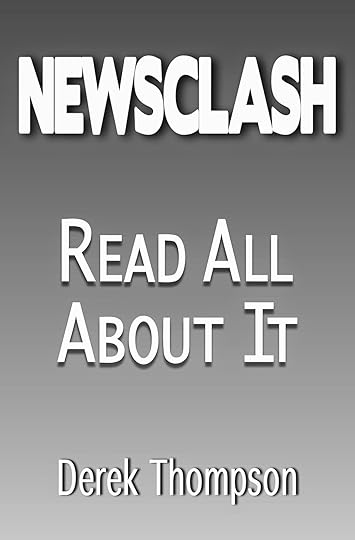
You can spend around a quid on it here.
You can read about the sister publication, Man Up!, here.
All reviews welcomed!
Published on May 05, 2014 10:07
April 25, 2014
Just My Luck*
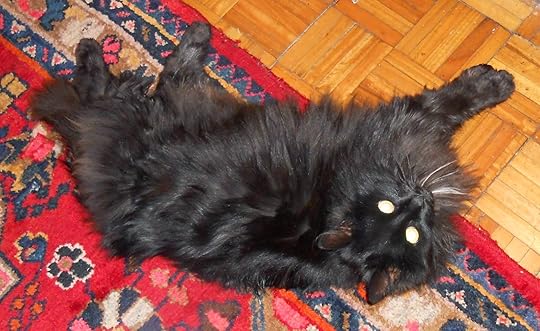 Unlucky for some?
Unlucky for some?Come on writers, you know the feeling:
Your book has been rejected with nary a hint of what you can do about it before the next submission.- One of your writer friends, who's been at it less time than you have, telephones to share news of her latest contract / publication date / agent's gala barbecue, on the same day you get a book proposal rejected.- That writing competition you sweated blood over ended up being won by a debut writer, barely out of his teens, who put his success down to the year he spent in South America funded by his publishing world parents.- The 5000 Twitter followers you cultivated so diligently has translated into three copies of your book sold (and one of them was your auntie, who you're certain will never read it). Meanwhile, another unknown author, in the same genre, used exactly the same approach to sell 100s of books in only three months.- The blog interview you were so thrilled to get has somehow mis-spelt your name.- Your book proposal has been accepted by a publisher, sort of. It's just that they're looking at 2016 and can't really confirm until next year whether it will really be viable.
Sometimes it can seem as though the black chicken of doom has made a nest out of your manuscript. We know that luck is an important factor in a writer's success and 'bad luck' can be a contributing factor when progress seems to be as elusive as a five leaf clover.
The essential thing to understand about luck - and this doesn't in any day diminish its impact or importance - is that it is unfathomable. Unless you subscribe to cosmic ordering, intercession or the application of sympathetic magic, you'd best get used to random outcomes - entirely outside your control or influence - in the mix.
Of course, it's human nature to focus on what is desired or what's missing, rather than the good fortune that has, black cat-like, already crossed your path.
Chances are that you've written - or are writing - a book of some kind. If so, congratulations! What good fortune to have had sufficient education, inspiration, time and opportunity to write something. I'm going to assume you're not currently starving, being tortured (artistic angst and writer's block doesn't count), imprisoned because of your beliefs / politics, or forbidden from expressing your ideas on paper / online. Lucky you, huh?!
You also have the marvellous luck to be alive at a time when technology is both available and affordable (and often free ), enabling you to self-publish your work, connect and interact with thousands of potential readers. That some technological good fortune also allows you to identify agents and publishers - many of whom welcome material submitted electronically. Imagine the advantages that gives you over writers past.
I can't promise you that 'your time will come' or even that 'talent will out'. Sometimes it's just luck of the draw - who opens your material on what day, what mood they're in, what they're looking for and how much time they have. If you've visited this blog before (in which case, I wish you all the luck in the world!), you'll know that all I can promise you is this: It all stops when you stop writing.
In the meantime, do count your blessings while you seek your writing fortune and be lucky.
Now, just for fun, and by way of balance for the bad luck stories above (which are all artistic licence versions of my own experience), here are a few of my good luck stories.
- The two book covers given to me, by Annemarie Skjold of Whyte Tracks and James of www.GoOnWrite.com- The magazine editor who, while rejecting my original pitch, got back to me with a different proposal for a monthly magazine column. This month will mark the acceptance of my 25th monthly column. - Every non-fiction editor and website owner who has accepted and published my initial pitch, including this one over at Bubble Cow.- Musa Publishing, for turning two of my short tales into fully realised ebooks.
* The phrase 'just my luck' had been in my head for a day or so before drafting this post, and then I read about the death of the wonderful writer, Sue Townsend. We could debate into the wee, small hours whether we actually make our own luck. As writers, if we stick with it, we make our own stories.
Published on April 25, 2014 07:40
April 21, 2014
Picture This
Every time I get a new notebook, at some point as I gradually fill the pages, I draw an updated version of the same diagram. It's usually titled 'My Writing Universe' or something equally modest. Basically, it consists of an overview of everything I'm writing, have written, or really ought to be getting on with.
It covers genres and categories of writing (novels, short fiction, articles and features, comedy material, etc.) and the relationships between them. Think: lots of rough circles, lists and dotted lines. It helps me keep track and shows me where there are gaps and patterns. It's also a confessional for all those pieces I've yet to complete (or start, in some cases), sometimes added to the canon in pencil. 2B or not 2B, as they say.
I can't say whether that picture is worth 50 score words, but an image or graphical representation can allow us to see things differently.
While working on Scars & Stripes, my latest completed novel, I needed to see the shape of the book and whether the comedy, drama and, well, tragedy had the right balance. I especially wanted to get a feel for the rhythm of the highs and lows, from chapter to chapter. One graphing session later and hey presto it's clear that my idea of comedy tends to be more 'oh dear' than 'ha ha'.
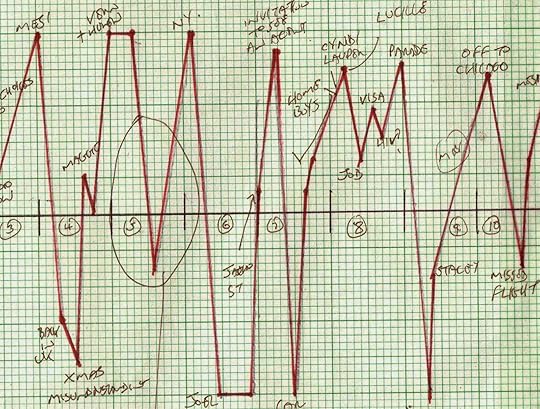
Another great visual tool, which I've used in the past, is Wordle. What better way to highlight those overused words that crop up like unexpected relatives? When I produced a Wordle for Scars & Stripes I was surprised at the result - see for yourself below.
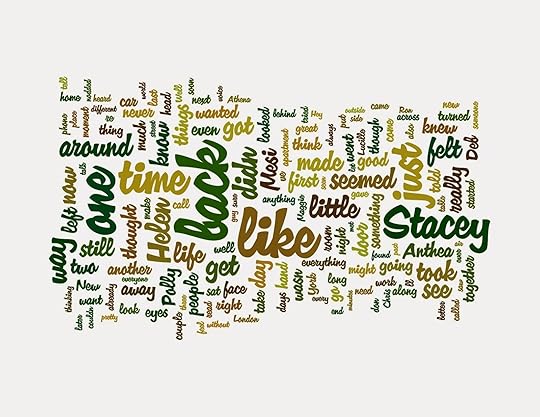
As they say, seeing is believing.
Published on April 21, 2014 05:40
April 3, 2014
One, two, free.
 Of all the words guaranteed to fire a writer up, few inspire as much passion, controversy and vitriol as the word
free
*. Many writers, starting out, are happy (or, at least, prepared) to allow their work to appear for gratis. There are some valid reasons for wanting to do it: gaining a publication byline, gaining a link / pdf for your portfolio, or gaining feedback, to name but three.
Of all the words guaranteed to fire a writer up, few inspire as much passion, controversy and vitriol as the word
free
*. Many writers, starting out, are happy (or, at least, prepared) to allow their work to appear for gratis. There are some valid reasons for wanting to do it: gaining a publication byline, gaining a link / pdf for your portfolio, or gaining feedback, to name but three.Critics argue that everyone deserves to be paid for their time and their labour, often bringing out the time-honoured plumber analogy.
I've been vocal in the past about the perils of writing for nothing, unscrupulous editors who exploit desperate writers and competitions where the rules insist that all entrants give up first rights to their submission, even if they don't make it to the final.
By way of balance, I should point out that I've written material for royalties that only existed in principle and never materialised in my bank account. I've also willingly written and edited for free because I wanted to help out or the cause / publication / website interested me.
The thing is, much as it pains me to say it, I've started to realise how much all writers rely on free stuff.
I use online news gathering services and websites to source topical material for gags and sketches. Similarly, Youtube and websites for lyrics enable me to create parody songs for performance. The web is also a brilliant research tool when I'm checking facts for articles and features (not just Wiki, honest!).
When I'm not listening to old radio progs on BBC iPlayer, I tend to go for either Beatles Radio or one of the Live365 stations.
Need some writing advice? There's a ton of it out there. I regularly read tips, links and content from Sophie Lizard, Jon Morrow, Gary Smailes, Mark Silver and others.
Looking for free information about paid writing gigs? Craigslist has been good to me.
Fancy a little distraction? How about a few games of pool on Miniclip?
And let's not forget a few of the essentials for jobbing writers - Skype, Dropbox, Webmail, Blogs and all those free apps.
Of course, as you'll have surmised, some services and information are given freely as an incentive to sign up for a more comprehensive version. I think that's fair enough. It's the closest you'll get to a free lunch.
So, free or not free - what's the verdict?
Everything may be black and white on the page, but trust me, off the page, it's a lot more colourful.
* Okay, maybe plagiarism - I'll give you that.
Published on April 03, 2014 03:30
March 29, 2014
Who? What? Where? Wye!
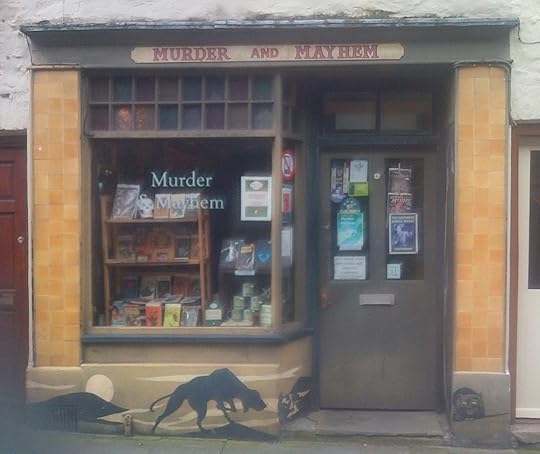 This writing business will be the death of us.
This writing business will be the death of us.Even out of season, Hay-on-Wye is the Shangri-La of book lovers and writers. Here, it is unusual to see someone who isn't reading, or carrying books around (possibly for effect - Jack Kerouac man, you know who you are). There are also numerous others, scribbling feverishly into their notepads (the paper kind), lifting their heads momentarily to snatch at inspiration as it does a runner down Lion Street. Judging by the clientele seen in the cafes, if the town isn't sponsored by The Guardian it's missing a trick.
There is competition among the bookshops, certainly, but there is also a sense of community. Collectively, they are greater than he sum of their shelves. Everyone knows why they're here - books - and that somehow gives the place a sense of tranquility. It's probably helped by some shops flying the anti-technology banner and proudly proclaiming, 'Kindles are banned here.'
To be honest, being confronted by so many books and bookshops is overwhelming. There's a part of me that wondered what the point is of writing books, when this deluge of literature already exists. And yet, there's also a poetry and magic about seeing books I have known and loved, at different points in my life, still up on the shelves for others to enjoy. Those treasured titles are time capsules for me, drawing me back not only to the book itself, but to all the personal circumstances surrounding it as well - who recommended or gave it to me, what was going on in my life at the time, and what my emotionalexperience of the book was (and is now). My elegant commentary aside, there are a lot of crap books there too.
Facing the sheer volume of new and used books, as we wandered from shop to shop, is also strangely liberating. If any of my books make it to print - and I do mean print- I hope they will one day find their way to a dusty shelf where an inquisitive reader might discover them. And if I happen to be giving a talk at Hay-on-Wye, about the launch of my eighth consecutive bestseller, so much the better. (Second would be fine, at this point, along with the bargain bucket.)
Hay-on-Wye reminds writers that there really is room for everyone is the book is well-written and has the courage of the author's convictions. Not everyone will get your book, and that's the way it's supposed to be.
I particularly loved Richard Booth's Bookshop, with its tiled exterior, its interior head-butting cat, the lovely wide staircase and the library-like high ceilings. My favourite bookshop, however, was Murder and Mayhem. For me, it epitomises what I love about good writing - whatever the genre: distinctive, true to its genre and unapologetically enthusiastic about it as well.
Published on March 29, 2014 09:27



